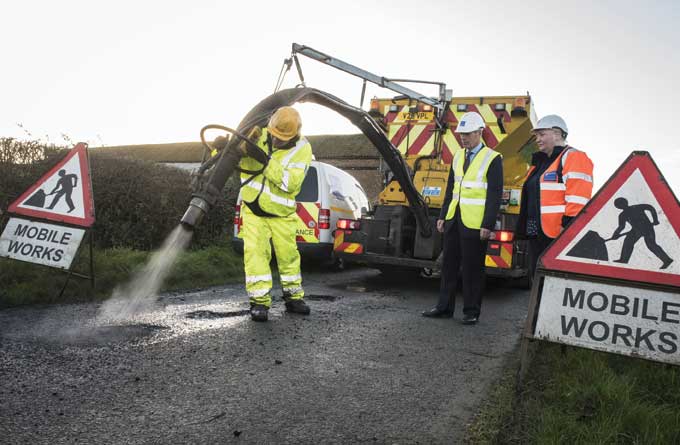As part of its continuing efforts to tackle potholes on the county’s roads, North Yorkshire County Council is trialling a system designed to speed up the process of filling holes.
The Velocity Jet Patcher is designed to fill potholes much faster than conventional methods.
Over a three-week trial, three teams are operating the machines across the Harrogate district. Two are working in rural areas and the other in urban areas, such as Harrogate, Knaresborough and Ripon.

The crews operate from a vehicle about the size of a gritter. The system uses high-volume air to remove all dust and debris from a pothole. A cold bitumen emulsion is then fired into every crack to seal the hole before aggregate is fired in at high speed. The process takes only a couple of minutes for each hole. There is no excavation, no waste material and the filled hole is ready to drive on immediately.
Traffic management will be in operation around the crews and it may be necessary to close roads briefly while they work.
A programme of repairs has been drawn up by the County Council’s highways team, but in addition the crews will repair other defects detected during their work.
County Councillor Don Mackenzie, Executive Member for Highways, said: “Potholes are a big concern for the County Council and we know that concern is shared by the county’s residents. We are always looking for innovative ways to deal with the issue, which is why we are trying this new approach.
“Residents sometimes tell us that emergency patching of potholes is too temporary. In addition to its speed, the jet patcher is claimed to extend the life of such a repair. We believe it will offer a cost-effective solution while minimising waste and maximising the speed of repairs. We’ll be monitoring its performance during these three weeks.”
In recent years, the County Council has shown its strong commitment to roads maintenance.
In 2014, it announced a major programme of highway work to repair the ravages of harsh winters on its highways network. The programme, which will cost £50m and will take seven years to complete, is jointly funded by the Government and the County Council, and is in addition to the £25m-plus that the council normally spends on highway repairs each year. In addition in 2014/15, it spent a further £10.7m, which came partly from the council’s reserves and partly from match funding from the Government.
